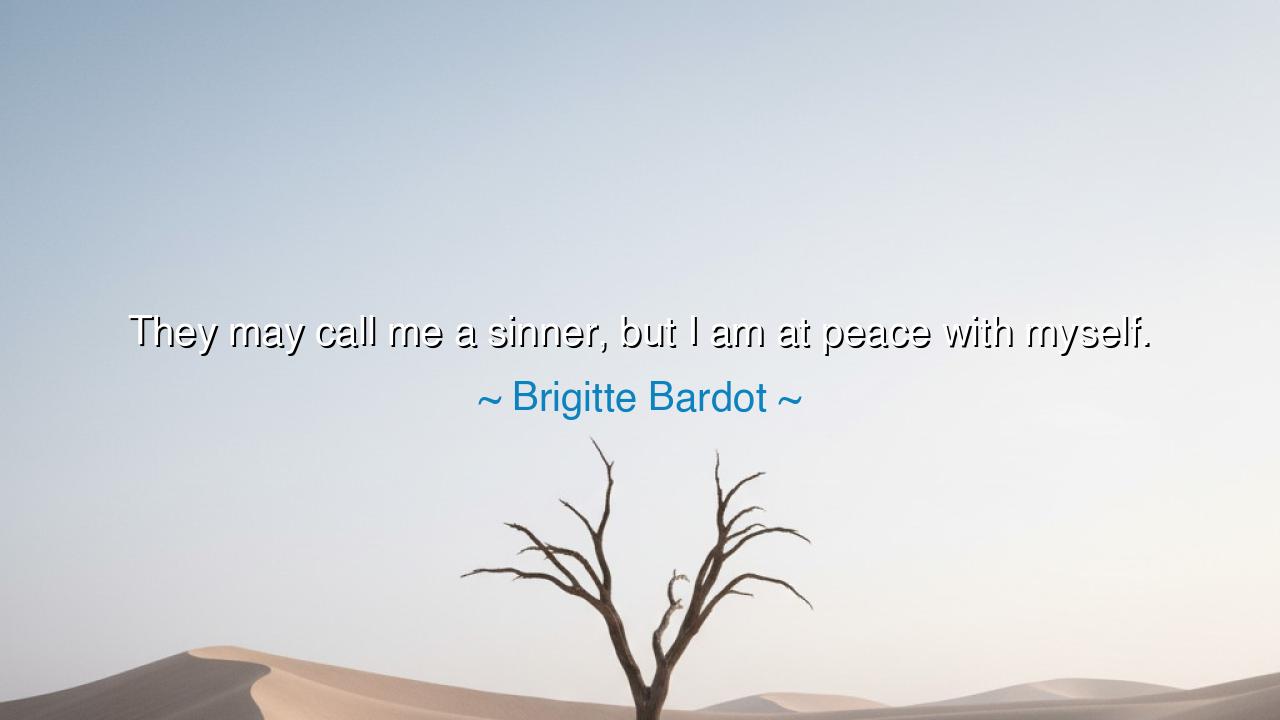
They may call me a sinner, but I am at peace with myself.






The words of Brigitte Bardot—“They may call me a sinner, but I am at peace with myself.”—resound like the defiance of a soul that has tasted judgment and yet stands unbroken. In them lies an eternal struggle: between the voices of the world that condemn, and the inner voice that knows its own truth. To be called a sinner is to be branded by others, measured against the fragile standards of society, morality, or tradition. But Bardot proclaims something higher—that true freedom does not come from pleasing others, but from dwelling in peace with oneself.
The ancients understood this conflict well. Socrates, accused of corrupting the youth and dishonoring the gods of Athens, stood before his judges and declared that he would rather die than betray his conscience. To the crowd, he was a corrupter; to himself, he was faithful to truth. He drank the hemlock, but his spirit triumphed, for he chose peace with himself over the approval of the masses. In Bardot’s words, we hear the same unyielding spirit: the courage to embrace the name of “sinner” if it means remaining loyal to one’s own soul.
For society is fickle, ever changing its idols and its taboos. What one generation damns, another celebrates. A woman who dares to live freely, to speak openly, to defy convention, is often cast as an outcast, a rebel, even a sinner. Bardot, an icon who shattered expectations of femininity and dared to live unashamed, became both adored and condemned. Yet rather than bend under the weight of others’ judgments, she chose the higher path—to seek peace within herself rather than to chase the fleeting approval of others.
History is filled with those who bore the mark of “sinner,” yet carried greatness. Galileo was branded a heretic for proclaiming that the earth revolved around the sun. Joan of Arc was condemned as a witch for leading her people with faith and fire. Both were judged by their times, but both stood at peace with their convictions, for they knew the truth within was greater than the cries without. Their stories remind us that what men call sin may often be nothing more than courage misunderstood.
The lesson is clear: the judgment of others cannot be the measure of your soul. If you live only to avoid their condemnation, you will spend your days shackled by fear. But if you learn to dwell in peace with yourself—knowing that your actions, though imperfect, are true to your heart—then no insult, no accusation, no label of “sinner” can wound you. For the greatest freedom is not to be praised, but to be whole within.
Practically, this means turning inward each day, examining your life not with the eyes of others, but with the quiet honesty of your own spirit. Ask yourself, “Did I act in truth? Did I harm no one needlessly? Did I walk the path that aligns with my deepest values?” If the answer is yes, then stand firm, even when the crowd hurls stones of words. And if the answer is no, then correct yourself—not for them, but for the peace that only integrity can bring.
So let Bardot’s words be a shield for all who face the fire of judgment: they may call you a sinner, but if you are at peace with yourself, you are free. For the world will forget its accusations, but the soul remembers whether it stood true or faltered. Live, then, not for the fleeting applause or scorn of others, but for the eternal stillness that comes when your heart says, “I am at peace.”






AAdministratorAdministrator
Welcome, honored guests. Please leave a comment, we will respond soon